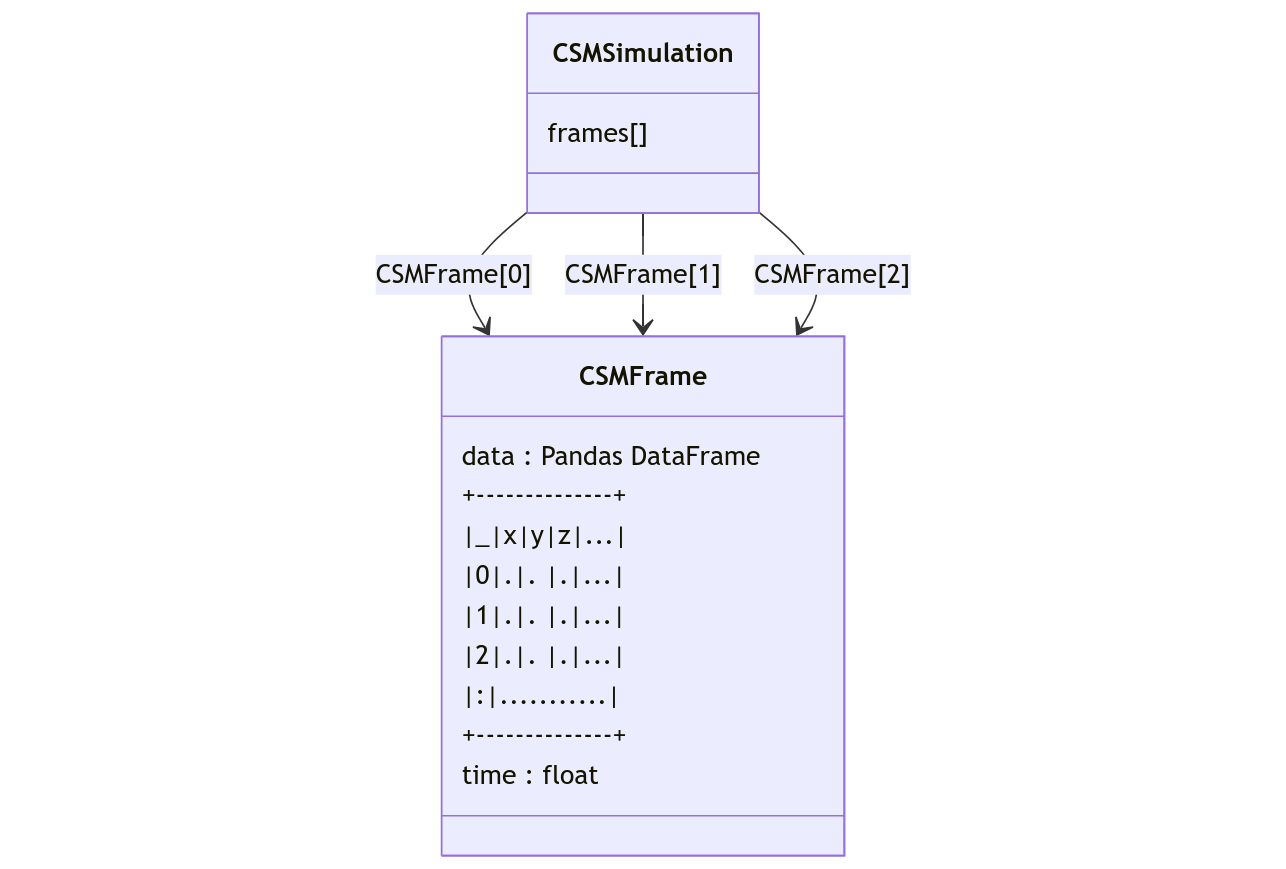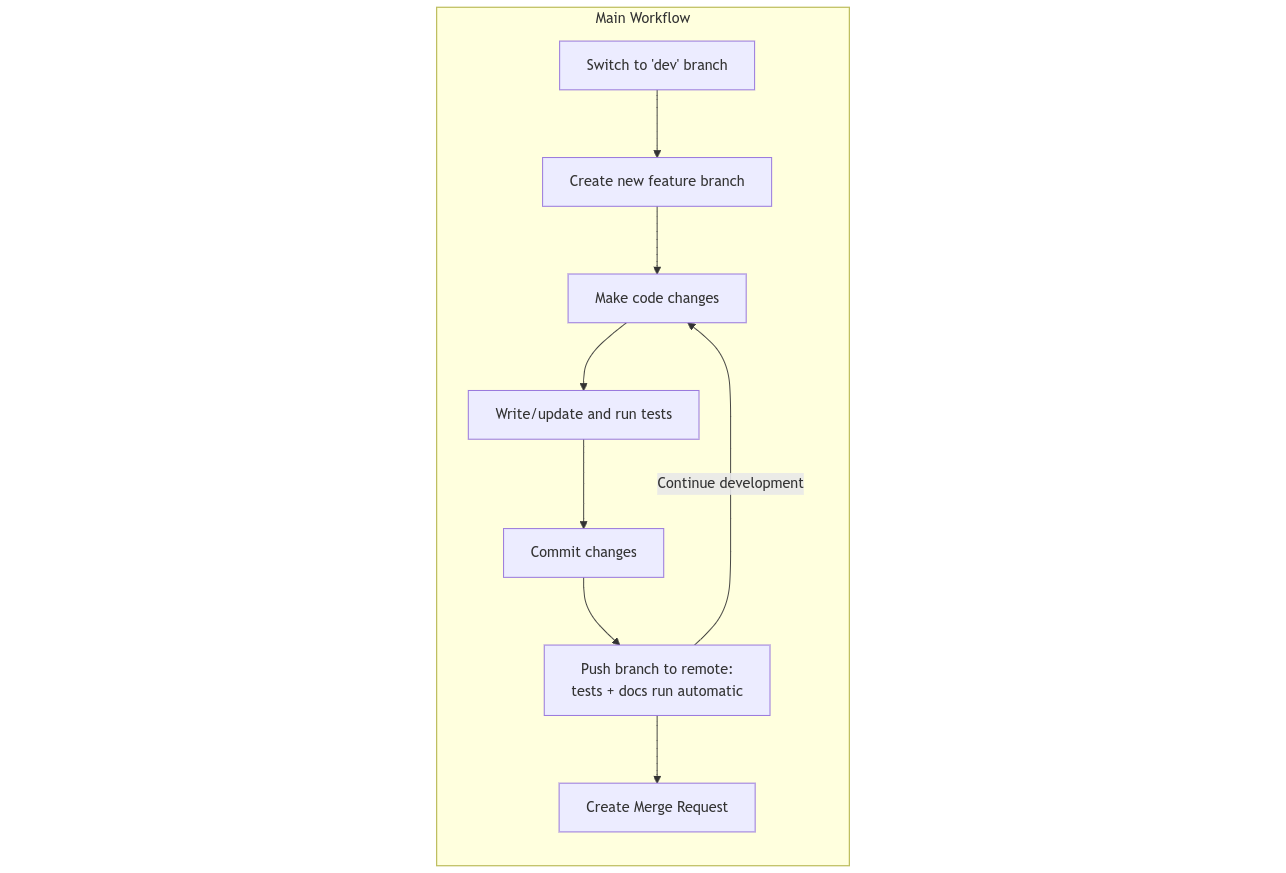Developer’s Guide¶
Welcome to the project! This guide will help you set up your development environment and provide guidelines for contributing to the project.
Development Environment¶
Prerequisites¶
See pyproject.toml and requirements.txt (requirements.txt will be verified as part of install process)
Getting Started¶
The Cytocalc documentation provides detailed instructions on installing and using Cytocalc.
Code architecture¶
Cytocalc provides CSMSimulation and CSMFrame objects.
A CSMSimulation contains a list of CSMFrame objects, which can be accessed using the frames attribute.
The following figure provides an overview of the code architecture for the project. It illustrates the main packages and modules, their relationships, and how they interact with each other.

The following figure provides an overview of the classes and data structures used in the project. It shows the relationships between different classes, their attributes, and methods.

(The above UML diagrams are automatically generated by Pylint’s pyreverse)
pyreverse -o png -p cytocalc ./src/cytocalc/

Class context for parsing cytosim report files¶
The
CSMFrameclass is used either to conduct a measurement on a single frame, or can be called byCSMSimulationto construct a time series of frames. An object of theCSMFrameclass contains a pandas dataframedataholding the data from a single cytosim saved frame, and an added attributetime.The
CSMSimulationclass is used to conduct a measurement on a time series of frames. An object ofCSMSimulationclass has an attributeframeswhich is a list whose elements are supposed to contain objects ofCSMFrameclass. It also has aparamsattribute.
Cytocalc can parse both the cytosim single file report of a full simulation and the multiple file reportF which produces a file per saved cytosim frame.
When implementing new functionality:
Check if the function is meaningful for a frame or the entire simulation: - Radius of the Network (
compute_radius()) is a method ofCSMFrame. - Rate of Contraction (contraction_rate()) is a method ofCSMSimulation.Functions like
theoretical_cont_rate()which do not directly use Cytosim data can be placed inhelper.py.The data in a
CSMFrameis accessible as either a Pandas dataframe (pandas_obj) or a Numpy array (np_obj).
Development Workflow¶

Branch Naming Convention¶
Feature branches:
feature/descriptive-nameBug fixes:
fix/issue-descriptionDocumentation:
docs/what-changedRelease branches:
release/version-number
Code Standards and Style¶
This project follows PEP 8 style guidelines. We use the following tools to maintain code quality:
Use meaningful variable and function names.
Write docstrings for all functions and classes.
blackfor code formattingisortfor import sorting
Run the following commands before committing:
black .
isort .
Testing¶
We use pytest for our test suite. Tests are located in the tests/ directory.
To run tests:
pytest
For test coverage:
pytest --cov=src tests/
Making Changes¶
Switch to
devbranch or an offshooting branchCreate a new branch for your changes
Make your changes
Write or update tests as needed
Run the full test suite
Commit your changes using conventional commit messages: .. code-block:: text
feat: add new feature fix: resolve bug docs: update documentation test: add tests refactor: improve code structure
Push your branch
If branch work done, create a Merge Request (see below)
Merge Request Process¶
Update documentation for any new features or changes
Ensure all tests pass and code quality checks succeed
Add a description of your changes to
CHANGELOG.mdOpen a Merge Request to
devbranch (or to offshooting branch) and request review from at least one team memberAddress any review comments
Ask another member (with member privileges) to Merge

Documentation¶
Keep docstrings up to date using Google-style format
Update
README.mdfor user-facing changesUpdate API documentation for public interfaces
Cytocalc uses Sphinx to automatically generate code documentation. Hence, we strongly suggest using docstrings.
Getting Help¶
Check existing issues and pull requests
Create a new issue for bugs or feature requests
Contact project maintainers through appropriate channels
License¶
Ensure all new code complies with the project’s license terms.